|

X
The world's
first 4th Dimension roller coaster is everything it promised to
be.
 How's
this for a familiar tale? How's
this for a familiar tale?
Big amusement
park announces precedent-setting, technology-busting thrill ride.
Heralds an opening date. Opening date comes and goes with no opening.
Ride eventually opens, then closes. The thrill-seeking community
collectively weeps.
These are
the times we live in, friends. Parks have learned there's only
one way to do business: innovate and take risks or watch the crowds
go somewhere else. And every major park chain, from Disney on
down, knows what it's like to swing for the bleachers and whiff
it once or twice.
Six Flags
Magic Mountain swung mighty hard when they hired Arrow Dynamics
to produce X, the world's first 4th Dimension roller coaster:
a hypercoaster with an essentially vertical drop, twenty-foot
wide trains with seats extending off either side of an innovate
four-rail track system, traveling at up to 76 miles per hour,
and—oh, yeah—passenger vehicles that rotate forward
and backward... should we really have been surprised by what
happened?
Late 2001,
X finally accepted paying customers only to operate sporadically,
and then shut down for a spell over the summer of 2002. More than
once, I hoped to ride and was denied.
But after
some rethinking and retooling of the coaster's off-the-charts
freaky vehicles, X did reopen. And this past December, I finally
got a taste.
Ay, chihuahua...
.
. . . . . . . . . . . . . . . . . . . . . . .
You may not
see much of X from Interstate 5, but once you drive up to Magic
Mountain's parking lot entrance, there it is off to the left,
in all its eye-watering, pink and yellow majesty. That first drop,
those two voluptuous raven turns... stir the soul, they do.
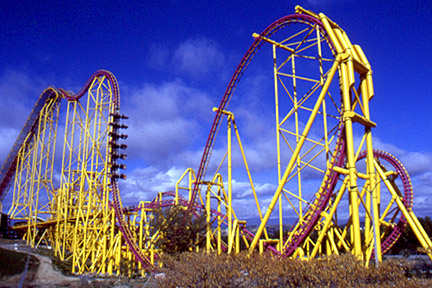
In the gate,
right up the hill past the carousel, past Revolution, over the
new bridge, gotta get there RIGHT NOW, pantpantpant... A train
cycles. It's working.
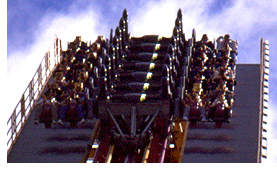 Waiting
to get into that station was probably the longest twenty minutes
of my life, thus far. Until my butt was actually in a seat and
we were in motion, I couldn't help but fear that something might
hiccup, a problem with a train, the turnstiles, whatever. "This
time, please, just let me get on this thing." Waiting
to get into that station was probably the longest twenty minutes
of my life, thus far. Until my butt was actually in a seat and
we were in motion, I couldn't help but fear that something might
hiccup, a problem with a train, the turnstiles, whatever. "This
time, please, just let me get on this thing."
My silent
prayer is answered. I chose to ride in the very back, outside
left. But before I did board, I stared and marveled at this contraption—the
trains are monsters. Wide as all outdoors and those big purple
"I dunno what the hell they are" dealies stickin' up
like serrated dragon claws.
Our journey
begins with us facing in the opposite direction of travel. The
chest-snuggling restraints get tucked down good and tight, but
everything feels pretty groovy. Legs hangin', plenty of room to
move the arms about, nothing in the way of the view back. Nice.
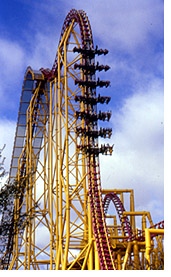 We
tip a tad and slide out, pulling a U-turn and then climbing up
the lift. Sitting in the last row, there's nothing but the entire
front portion of the Mountain’s thrill ride-crammed real
estate to look at as we ascend. Also means we are clueless regarding
what's coming. This is about when I started to realize I was just
a wee bit scared. Very nice. We
tip a tad and slide out, pulling a U-turn and then climbing up
the lift. Sitting in the last row, there's nothing but the entire
front portion of the Mountain’s thrill ride-crammed real
estate to look at as we ascend. Also means we are clueless regarding
what's coming. This is about when I started to realize I was just
a wee bit scared. Very nice.
Higher and
higher, and then we can hear the folks up ahead making more noise.
Uh, oh. There's a dip and we tip back even more and I'm wondering
if we're gonna completely flip over. But we don't. The seats rotate
forward as the train curls over the apex, so now we're staring
at the purple seat shells of the row in front of us. And we're
starting to plunge. Straight down.
Show time.
Over 200 feet,
free-falling, held tight face-first, roaring to a top speed of
76 miles per hour. Xcrutiating, Xquisite. But it's not until we
hit the bottom of this vertical shriek-a-thon that X really pours
on its unique charm.
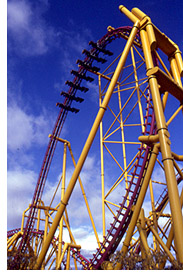 We
continue flipping and as we enter the base of the first towering
raven turn, our legs are tucking back beneath us. Lifting away
from Terra Firma, our bodies are feeling things... our eyes are
seeing things... that our minds can't quite put together. We're
soaring up, but now facing the horizon, yet still rotating, now
topping off, facing the ground again, from over 180 feet in altitude,
screaming along, full steam ahead. We
continue flipping and as we enter the base of the first towering
raven turn, our legs are tucking back beneath us. Lifting away
from Terra Firma, our bodies are feeling things... our eyes are
seeing things... that our minds can't quite put together. We're
soaring up, but now facing the horizon, yet still rotating, now
topping off, facing the ground again, from over 180 feet in altitude,
screaming along, full steam ahead.
Whoa.
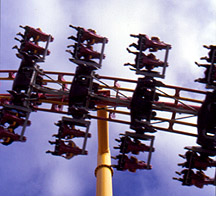 Before
you can figure out exactly what just happened, we're plowing down,
then up, and the seats do their spin-n-spew routine again, flipping
us head over heels as we crest a camelback. "Disorienting"
is the understatement of the freakin' century. Before
you can figure out exactly what just happened, we're plowing down,
then up, and the seats do their spin-n-spew routine again, flipping
us head over heels as we crest a camelback. "Disorienting"
is the understatement of the freakin' century.
We can take
a moment to get a grip as the train gracefully swoops around an
elevated turn, past and above the loading station. But it's only
a moment before the right-hand side of this multi-winged grotesquerie
corkscrews up and over, coupled with yet another wild flip-yer-lid
seat toss, thoroughly churning our gray matter into a useless
mass of quivering goo.
Into the last
raven turn, there’s simply no way to figure out which way
is up, or down, or left, or right anymore. We’re just hauling
keister in every possible direction. And before we hit the brakes,
there’s one last back flip before we slither home… breathing
hard, and finding it impossible to make sense out of all that
heavenly havoc.
.
. . . . . . . . . . . . . . . . . . . . . . .
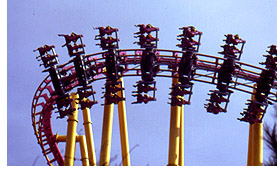 I
challenge anyone who takes a cold ride on this machine to get
right off and describe in accurate detail what they’ve just
been through. Never before has a roller coaster absolutely demanded
several rides to decipher its entire acrobatic catalog. And that
alone puts X in a class all by itself. I
challenge anyone who takes a cold ride on this machine to get
right off and describe in accurate detail what they’ve just
been through. Never before has a roller coaster absolutely demanded
several rides to decipher its entire acrobatic catalog. And that
alone puts X in a class all by itself.
Was it worth
the wait? Damn straight. It is gonzo.
.
. . . . . . . . . . . . . . . . . . . . . . .
I spoke with
Alan Shilke, the Arrow engineer responsible for creating this
whirlwind wunderkind and we chatted about the development
of the 4th Dimension and where it’s headed next.
RC:
What was the inspiration for the 4th Dimension?
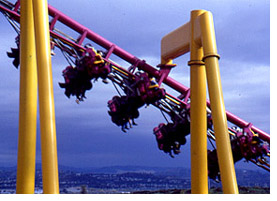 AS:
Well, that started way back when I was a kid, actually. My being
a kid, your biggest exposure is to ride all the carnival rides
and my favorite one was the Zipper. And I wanted to put a Zipper
on a roller coaster and take it somewhere. AS:
Well, that started way back when I was a kid, actually. My being
a kid, your biggest exposure is to ride all the carnival rides
and my favorite one was the Zipper. And I wanted to put a Zipper
on a roller coaster and take it somewhere.
RC:
When did you first start developing the ride?
AS: We started
looking at it at Arrow in 1995, but it never really got very far.
RC:
What slowed development down?
AS: Basically,
at that time, there were a lot of people in the company that had
funny ideas about how to make it spin. When I brought it to them
and said, "Let's build this," we didn't know how to
make it happen, just what we wanted to happen. So we started working
on it and there were all sorts of funny ideas, like we'll stick
an electric motor on it and it'll read a piece of tape stuck to
the track that will tell the car when to start spinning or stop.
And then you start thinking about safety that goes along with
these things, and just getting it under control.
And we got
in financial troubles way back then and couldn't really spend
time on development. If it wasn't a paying job, we pretty much
couldn't work on it. So that's why it went "unworked-on"
for the next four or five years.
 RC:
So when did the breakthrough of using a multiple rail system hit? RC:
So when did the breakthrough of using a multiple rail system hit?
AS: I'd have
to say it was in a dream. At the time I wasn't thinking it was
a third and fourth rail, I was thinking it would be just a third
rail to control the spin. I can't really say how or why it came
about, it was just one of those things; one day I woke up and
said "Hey!" That was somewhere in '97 or '98. I wasn't
working on the project at all but it was always in the back of
my mind.
RC:
I understand the whole thing got jump-started by a meeting with
Gary Story of Six Flags.
AS: Yes, we
had changed the leadership of [Arrow] and got a meeting with Story
because of that. He was pretty unhappy with some of the [previous
management] and we weren't working much with Six Flags in general.
And so we did what we could to get our meeting with him and he
sat down with us and we showed him everything we had. And he just
kind of looked at us and said "That's all really neat and
all, but I have all that in my parks already. What do you have
that's new? Show me something good."
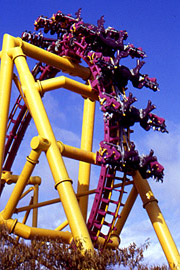 At
the end of '95, beginning of '96, we made a little animation that
nowadays you'd laugh at, really kind of cheesy, but I had that
CD for the heck of it, didn't think I'd ever show it to him. But
after he said that, I thought, "Now's the time, man!"
I'd shown it to other people in the company, no other customers,
but everybody that came to Arrow that was somewhat interested
and nobody really caught on; nobody really looked at it and said,
"Wow, cool!" Gary Story was the first one to actually
appreciate it. At
the end of '95, beginning of '96, we made a little animation that
nowadays you'd laugh at, really kind of cheesy, but I had that
CD for the heck of it, didn't think I'd ever show it to him. But
after he said that, I thought, "Now's the time, man!"
I'd shown it to other people in the company, no other customers,
but everybody that came to Arrow that was somewhat interested
and nobody really caught on; nobody really looked at it and said,
"Wow, cool!" Gary Story was the first one to actually
appreciate it.
RC:
That's amazing; I gotta say I'm really surprised to hear that.
But I'm glad somebody finally did. And I remember when we were
chatting at one of the trade shows, you'd said Story wasn't interested
in a small-scale ride, he wanted a major, major ride, right from
the get-go, yes?
AS: A lot
of that was Magic Mountain. He knew he wanted that ride to go
to Magic Mountain and they were the ones who said, "Hey,
if it's not bigger than the Viper... We don't build small rides
here. You might be able to sell that to one of Gary's other parks,
but if you're gonna put that in here..."
RC:
We know a lot of engineering work has been done with the trains
since X opened. Can you describe a little bit what was done to
reinforce the train?
AS: The biggest
thing that took the most work was... actually there's a suspension
system that goes between the seat fork that holds the people,
and the main chassis, and that wasn't there when we originally
built it. Because of the speed of the ride, the narrow track gauge
compared to the width of the vehicle, we were getting a lot of
vibration in the outer seats. And so the major modification was
really to add that suspension in there. I mean, you can read it
on the Internet where everybody says, "[the trains] are all
bending and bowing!" and, you know, "It's gonna break!"
and everything, and no, that's the suspension. The travel in the
outside seat is almost five inches, when you're bouncing around
out there on the ride.
 RC:
It looks like they did some work on the track, too, putting some
flooring under the valleys. RC:
It looks like they did some work on the track, too, putting some
flooring under the valleys.
AS: Yeah,
they've taken it upon themselves, basically on every ride out
there, if they can't evacuate it with a cherry picker, they have
to have some way to get people off the ride. I think it was mostly
because they had an instance on [another SFMM coaster] that gave
them a little bit of a scare with a stalled train. And they started
really worrying about, you know, "what if a train stops there?" Basically, they have no way besides bringing
in a crane and pulling people down one at a time and they don't
want to do that. So, the two areas where they put the flooring
in are two areas that are outside the reach of any kind of machinery
they have, except for a crane. So they said, "We can't have
that, we better put in a way to get the people off there."
RC:
Now that X is back in business and the whole Arrow-S & S merger
has taken place, the big question I know a lot of people are asking
is "What's next for this ride system?"
AS: We're
still pursuing similar rides, you know, a chain lift, 24-, 28-passenger
train-type systems. We have a customer we're trying to reel in,
of course. On that one, it's been kind of holding off for a long
time, so we gotta that thing secured. So there's still that system.
But what we're
working a little more heavily on the marketing side is a launched
version.
RC:
Excellent!
AS: And in
order to launch it, you can't launch a big old train, so it's
actually an eight-passenger version we're trying to launch.
RC:
And would this use S & S's compressed air system?
AS: Yes. And
so we've got proposals for things that look like a normal coaster
that's launched, and a lot more proposals that are kind of more
of an out-and-back launched, big element, a couple of cool things,
and then back into the brakes.
RC:
Cool, instead of a sort of twister layout, like at Magic Mountain.
Some of these new speculative layouts, do they all incorporate
the vertical drop or are they more traditional?
AS: No, not
all of them... mostly with the launched ones, actually, I can't
think of anything that goes straight up and down. Some are very
short, some are a little longer, but definitely weird things,
just anything new and different we can come up with.
RC:
I know there's probably a lot you can't talk about too directly,
but are there some kind of elements that you have planned for
a 4th Dimension system that you didn't incorporate on X?
AS: Oh, yeah.
Oh, yeah. In terms of the way the vehicles turn, we definitely
have, you know like at Magic Mountain, there's a straight back-flip
and then I call "Half/Halves," a half-spin in the seat
and a half-bank around the vehicle, a 180-degree bank and a 180-degree
spin. We've got a whole lot more we can do. The "One-and-a-Half/Half"
is probably my favorite.
RC:
"One-and-a-Half/Half?"
AS: You do
one and a half backflips, and then the train would roll over the
other 180-degrees. And then the "Full/Full" [360-degree
vehicle spin, 360-degree bank] is obviously an option as well.
It'll take some pretty big floater hills to get it all in there,
so they take pretty big rides to do the "One-and-a-Half/Half"
and the "Full/Full."
RC:
Very cool, very nice. But the basic technology for getting the
trains to rotate, that's still going to be incorporated, yes?
AS: Our system
with the eight-passenger vehicle definitely looks a little different,
as far as how the track gets together with the vehicle. But it's
still the idea that there's a control rail that sets the angle.
RC:
Do you think at some point you might go to a single rail, instead
of a pair?
AS: Yeah,
that's our hope on the eight-passenger one.
RC:
Are there any other things S & S/Arrow has cooking in the
coaster department you can talk about?
AC: There's
definitely some big plans for things we haven't openly discussed...
crazy ideas.
.
. . . . . . . . . . . . . . . . . . . . . . .
X
- TRACK LENGTH:
3,610 feet
- TOP SPEED:
76 miles per hour
- MAX. G
FORCE: 4 Gs
- MAX. HEIGHT:
175 feet
- MAX. DROP:
215 feet
- MAX DESCENT
ANGLE: 88.5 degress
- INVERSIONS:
6
- RIDE DURATION:
2 minutes, 50 seconds
- CARS: Two
trains composed of 7 cars. Each car accommodates four passengers
across.
- DESIGN
AND ENGINEERING: Arrow Dynamics
Top |